Electric vs hydrogen cars: which is better?
A guide to the pros and cons of electric and hydrogen cars
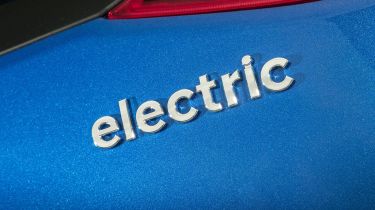
The world is going electric. And with prices dropping and range increasing, electric cars are becoming more viable for more people. As a result, the market is soaring. In 2020, a raft of new electric-car models will go on sale – and very soon nearly every manufacturer will have at least one electric car in their range.
According to the Society for Motor Manufacturers and Traders, electric cars and plug-in hybrids account for 3.4% of the new-car market, with 35,000 plug-in cars sold up to August 2019. That’s a 90% increase in just three years and predictions are that this market share will double in 2020 as electric and plug-in cars become mainstream. But before you rush out for an electric car, you might want to consider the alternatives.
At the moment, the only real contender is hydrogen. For many manufacturers, hydrogen isn’t seen as a replacement for electric cars, but rather another choice for consumers. And it has many benefits. Let’s take a look at the key differences between electric cars and those powered by hydrogen fuel cells.
Availability
There are currently only two electric cars on UK roads: the Toyota Mirai and Hyundai NEXO. However, several car manufacturers are making big noises about hydrogen playing a part in the future of clean mobility. For instance, BMW will launch a hydrogen-fuelled X5 in 2025. And Audi is moving forwards with h-tron, its hydrogen powertrain, with a car potentially going on sale in 2021.
That technology is also likely to make it into other Volkswagen Group brands, such as Porsche and Bentley. Toyota aims to build 30,000 fuel-cell cars in 2020 and Hyundai has revealed a hydrogen fuel-cell truck concept. Compare that to fully electric and plug-in hybrid cars. At the last count, buyers had a choice of about 80 electric models, in a variety of bodystyles and prices.
Range
Range is one of the biggest concerns of electric-car drivers. And while it’s increasing all the time, the longest you can travel between charges is 375 miles in a Tesla Model S Long Range – enough to take you from London to the Scottish borders. The problem is, and continues to be, the time it takes to recharge.
Even using a Tesla Supercharger, it takes about 40 minutes to take the battery from 10-80%. It’s only a minor inconvenience, but still a pain if you’re on a cross-continent jaunt. Compare that with hydrogen cars, which can replenish their fuel tanks in about the same length of time as a petrol or diesel car – as well as go further. The Hyundai NEXO will manage 414 miles before needing a refill.
Infrastructure
There are currently only 13 hydrogen fuel stations in the UK (although there are plans to extend this to 65 by 2030). The majority of these are in the southeast, with the rest spread throughout the country. There’s only one hydrogen station each in Wales and Scotland.
In comparison, the electric-car charging network is growing day by day, with huge government and private investment seeing high-speed charging points popping up in towns, motorway service stations and public car parks. As of late 2019, there were 10,000 places to charge an electric car in public, with 16,000 individual charging points and over 27,000 individual charging connectors.
Environmental impact
With hydrogen cars, the only tailpipe emissions are water. And if the hydrogen is produced from 100% renewable sources, it's about as clean a fuel as you can get. The car is propelled by extracting hydrogen, the most abundant element on earth, and mixing it with oxygen in a fuel cell to create electricity.
A typical method for producing hydrogen involves separating it from natural gas, but it can also be collected from biomass, which can significantly cut the lifetime emissions of hydrogen cars to less than that of electric cars – even if their energy comes from renewable sources.
The problem for electric cars is the environmental cost of producing their batteries. Lithium-ion uses a mixture of rare-earth materials; a lot of carbon is produced in their excavation. Then there’s the electricity source to take into account. If the electricity used to charge an electric car comes from a fossil-fuel power station, it’s only marginally better for the environment than a combustion-engined car. However, as countries move to generating cleaner energy from renewable sources, this will improve.
Price
Both electric and hydrogen cars are pricey when compared with combustion-engined cars, for now. But as the technology for both develops, and consumer demand picks up, economies of scale will drive prices down to more affordable levels. The Hyundai NEXO costs £65,995 and the Toyota Mirai costs £65,219. New electric cars start at just over £15,000 for the three-seater Uniti One; most supermini and hatchback-sized modes are £25,000-plus.
As for running costs, a kilogramme of hydrogen costs around £10, so the Toyota Mirai will cost £50 or so to fill – not much cheaper than a diesel car. Electricity rates are between 12 and 14p per kWh and, if charged overnight when electricity is cheaper, something like a BMW i3 only costs £6 for a full charge, giving a range of about 200 miles.
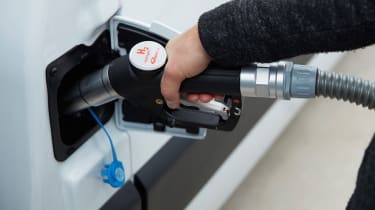
Hydrogen cars: for and against
Pros: Very clean, excellent range, quick refuelling
Cons: Expensive cars, poor infrastructure, not that cheap to run

Electric cars: for and against
Pros: Wide choice of models, growing infrastructure, range increasing
Cons: Purchase prices, recharging times, environmental concerns about batteries
Most Popular
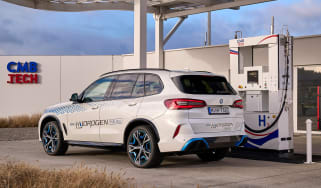
Where can I buy hydrogen and where is my nearest hydrogen filling station?
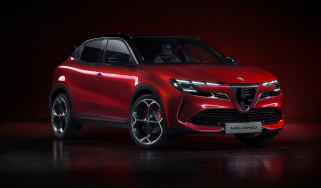
New Alfa Romeo Junior: the baby electric SUV formerly known as Milano
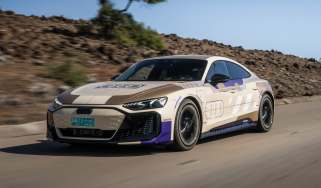
Audi RS e-tron GT gets big improvements and welcome changes